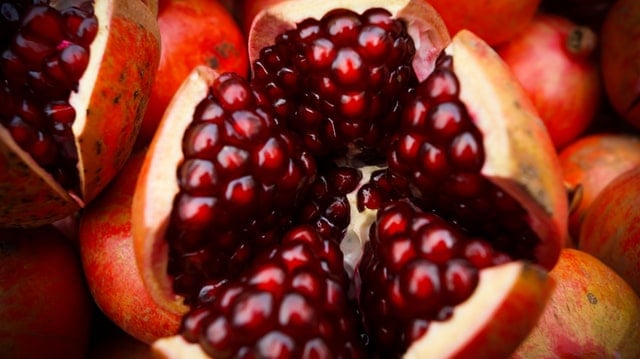
Pet owners differ on whether or not to give pomegranates to their dogs. When deciding if the food is safe for your dog, one should assess the possible health risksfpr the dog. Therefore, it is better to treat your pet with something that will definitely not harm him. Safe fruits and berries include apples (green-skinned), bananas, melons, strawberries and blueberries.
What are the benefits and harms of pomegranate
Pomegranate has many beneficial properties, and first of all it has a positive effect on the cardiovascular system, increases immunity, improves blood composition – increases hemoglobin. In addition, pomegranate has anti-inflammatory and antibacterial effects, improves the function of the thyroid gland.
An important effect of pomegranate is its ability to remove radioactive substances, toxins from the body, and a healing effect on the liver. The fruits are a whole storehouse of useful substances, including:
- fiber needed for good digestion;
- vitamins – A, C, groups B, D, E;
- trace elements – calcium, potassium, iron, magnesium, phosphorus, sodium, zinc and others;
- saturated and polyunsaturated fatty acids.
Pomegranate contains a large amount of acids that can damage the stomach lining. Therefore, pomegranate is not recommended for those who suffer from peptic ulcer disease. Another limitation is high blood pressure – hypertension, as pomegranate tends to thin the blood.
Important! With all the useful properties of pomegranate, it is better not to give it to dogs. 2-3 grains will not cause much harm, but if you want to feed your pet with a treat, it is better to give him an apple or other safe fruit.
Why pomegranate can be bad for dogs
Veterinarians say that the dog’s diet should be balanced, it should contain vitamins and minerals, amino acids. However, fruits and berries are not the most necessary foods on the dog’s menu. And pomegranate is on the list of prohibited fruits for dogs.
The reason is the presence of tannin in it, which in large quantities is harmful to pets.
Tannin is a plant-derived substance, a phenolic compound with astringent properties. It has anti-inflammatory, antibacterial properties, promotes the removal of salts of heavy metals and toxins from the body, strengthens the walls of blood vessels. However, large amounts of tannin are harmful to dogs. In animals, it can cause dysfunctions of the digestive system, diseases of the cardiovascular system.
Pomegranate seeds, unlike grapes, for example, are not toxic to dogs, but they can have a negative effect on the digestive system of an animal, which is more sensitive than that of humans. Acids in large quantities in fruits can damage the stomach lining.
Pomegranate juice can also cause no less harm to the pet’s body – it, like the grains of the fruit, contains acid that irritates the stomach.
Tannin can cause vomiting and prolonged diarrhea in dogs, severe abdominal pain. The reaction is individual, but is it worth putting the animal’s health at risk?
Another reason veterinarians have declared the southern fruit taboo is the high likelihood of an allergic reaction. It can be provoked by:
- chemicals that are used to process fruits in order to preserve them during storage and transportation;
- dyes, which are found in large quantities in the grains.
Important!
If a dog accidentally swallows a few grains, it is not dangerous for the pet’s life. But you should monitor the reaction and at the slightest sign of allergy, you should contact your veterinarian.
Manifestations of an allergic reaction:
- swelling of the face and limbs;
- itching;
- rash on the body;
- discharge from the nose, ears, eyes;
- unpleasant odor from body and coat.
These signs can appear individually or in combination, but require veterinary intervention.
Important!
There are dog breeds that are more prone to allergies than others. These are terriers, setters, retrievers and flat-faced dogs. It is better not to give them pomegranates at all.
It is strictly forbidden to give pomegranates to pregnant females and small puppies. The deterioration of the well-being of a pregnant dog will definitely negatively affect its offspring. In puppies, acid causes stomach irritation, abdominal pain, and intestinal upset.
Pomegranate seeds are toxic to pets. They contain substances that cause acute poisoning. It is especially important to protect small breed dogs from such food. Their bones can lead to obstruction of the stomach and intestines, which is fatal.
How to tell if a dog has been poisoned by a pomegranate? For the following symptoms:
- vomiting;
- diarrhea;
- increased thirst;
- weakness;
- manifestation of anxiety;
- rapid breathing;
- attempts to chew wood, bark, grass, paper.
As a first aid, you can give the dog an enterosorbent, the one that is in the home medicine cabinet will do – activated carbon, Enterosgel, etc. Then you should contact your veterinarian.
Important!
The crusts of the southern fruit are astringent, so they are often used to prepare a decoction for diarrhea. However, any folk remedies require consultation with a veterinarian, since other serious diseases can also be the cause of diarrhea.
Pomegranate in industrial feed
Many dog owners are not afraid to give pomegranate seeds, since they have met information that some manufacturers add it to their feed. However, it should be understood that the composition of the feed contains processed fruits, from which the seeds and peels have been removed. Pomegranate crushed to a powdery state and specially prepared pomegranate is added to the feed in minimal quantities. Any possibility of a negative effect of such a substance on the dog’s body is excluded.
In conclusion:
Though pomegranate is not toxic to dogs, avoid feeding it to your pet. If your dog accidently eats pomegranate, it won’t cause harm. But be vigilant if the dog shows any allergic reaction.






